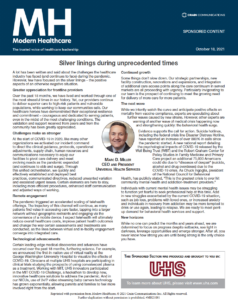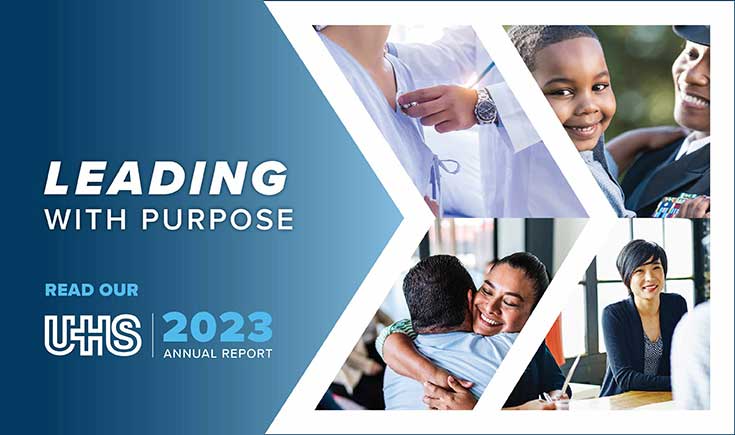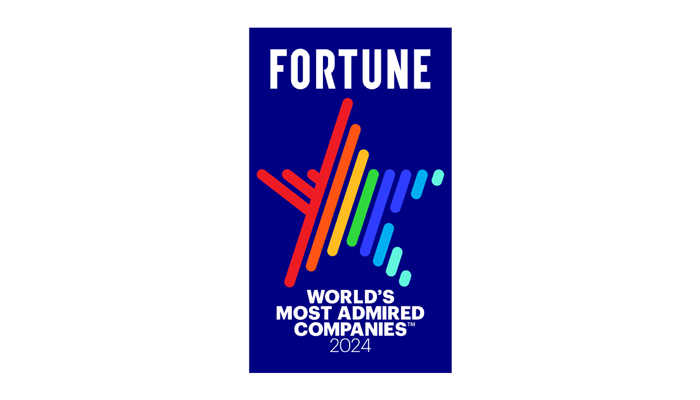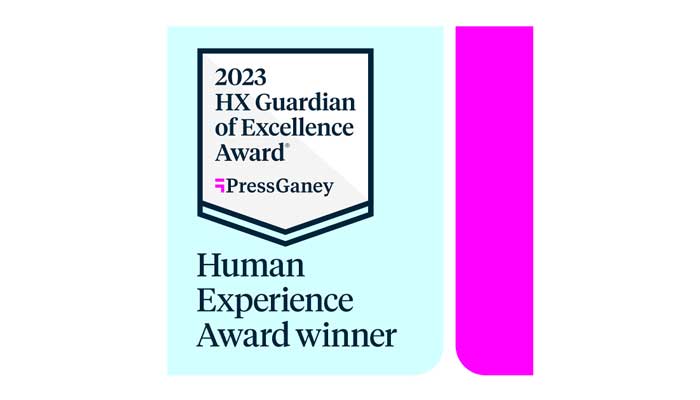 By Marc D. Miller, President and CEO, Universal Health Services
By Marc D. Miller, President and CEO, Universal Health Services
October 2021
A lot has been written and said about the challenges the healthcare industry has faced (and continues to face) during the pandemic. However, few have focused on the silver linings – the positive aspects of an otherwise negative situation.
Greater Appreciation for Frontline Providers
Over the past 18 months, we have lived and worked through one of the most stressful times in our history. Yet, our providers continue to deliver superior care to high-risk patients and vulnerable populations, while working to keep our communities safe. Our Healthcare Heroes have demonstrated their exceptional resilience and commitment – courageous and dedicated to serving patients, even in the midst of the most challenging conditions. The validation and support received from peers and from the community has been greatly appreciated.
Challenges Make Us Stronger
At the start of COVID-19 in 2020, like many other organizations we activated our Incident Command to direct the clinical guidance, protocols, operational adjustments, supply chain, human resources and communications necessary to equip our facilities to pivot care delivery and meet evolving needs as the pandemic expanded (and continues to ebb and surge). Through this unified orchestration, we quickly and effectively established and deployed best practices, communicated directives, reduced unwanted variation and escalated urgent issues. Certain elements are here to stay, including more efficient procedures, enhanced staff communication and adjusted ways of working.
Remote Engagement
The pandemic triggered an accelerated scaling of Telehealth offerings. The trajectory of this channel will continue, as many patients find value in accessing care faster, tapping into a larger network without geographic restraints and engaging via the convenience of a mobile device. I expect Telehealth will ultimately reduce overall healthcare costs, improve patient health outcomes and change the way certain assessments and treatments are conducted, as the lines between virtual and in-facility engagement converge into integrated care.
Technological Advancements
Certain leading-edge medical discoveries and advances have occurred over the past 18 months, furthering science. For example, we announced the first-in-nation use of Virtual Reality at The George Washington University Hospital to visualize the effects of COVID-19. Clinicians at multiple UHS hospitals are participating in clinical trials studying the prospects of using convalescent plasma as a treatment. Working with MIT, UHS innovators participated in the MIT COVID-19 Challenge, a hackathon to develop new, innovative healthcare solutions to address the pandemic. And in our NICUs, use of 24/7 video streaming baby camera technology has grown exponentially, allowing parents and families to feel more involved right from the start.
Continued Growth
Some things don’t slow down. Our strategic partnerships, new facility construction, renovations and expansions, and integration of additional care access points along the care continuum in served markets are all proceeding with urgency. Particularly invigorating to our team is the prospect of continuing to meet the growing need for delivery of more care for more patients.
The Next Wave
While we intently watch the curve and anticipate positive effects on mortality from vaccine compliance, experts are speculating about further waves caused by new strains. However, other experts are warning of another wave of medical crisis happening now and strengthening quickly: the behavioral health surge.
Evidence supports the call for action. Suicide hotlines, including the federal crisis line Disaster Distress Hotline, have reported an increase of over 800% in calls since the pandemic started. A new national report detailing the psychological impacts of COVID-19 released by the Well Being Trust (WBT) and the Robert Graham Center for Policy Studies in Family Medicine and Primary Care project an additional 75,000 Americans could die due to “diseases of despair” (suicide, alcohol and drug overdoses) due to the COVID-19 crisis. As Chuck Ingoglia, president of the National Council for Behavioral Health, has publicly stated, “This is the greatest crisis to ever hit community mental-health and addiction-treatment providers.”
Individuals with current mental health issues may be struggling to function yet fearful to seek professional help at this time. Add in new struggles exacerbated by the current COVID-19 situation, such as job loss, problems with loved ones, or increased anxiety and individuals in recovery from addiction may be more tempted to drink or use again, leading to relapse. We are ready to meet pent-up demand for behavioral health services and support.
New Horizons
While no one can predict the months and years ahead, we are determined to focus on progress despite setbacks, see light in darkness, leverage opportunities and emerge stronger. After all, you never know how strong you are until being strong is the only choice you have.










